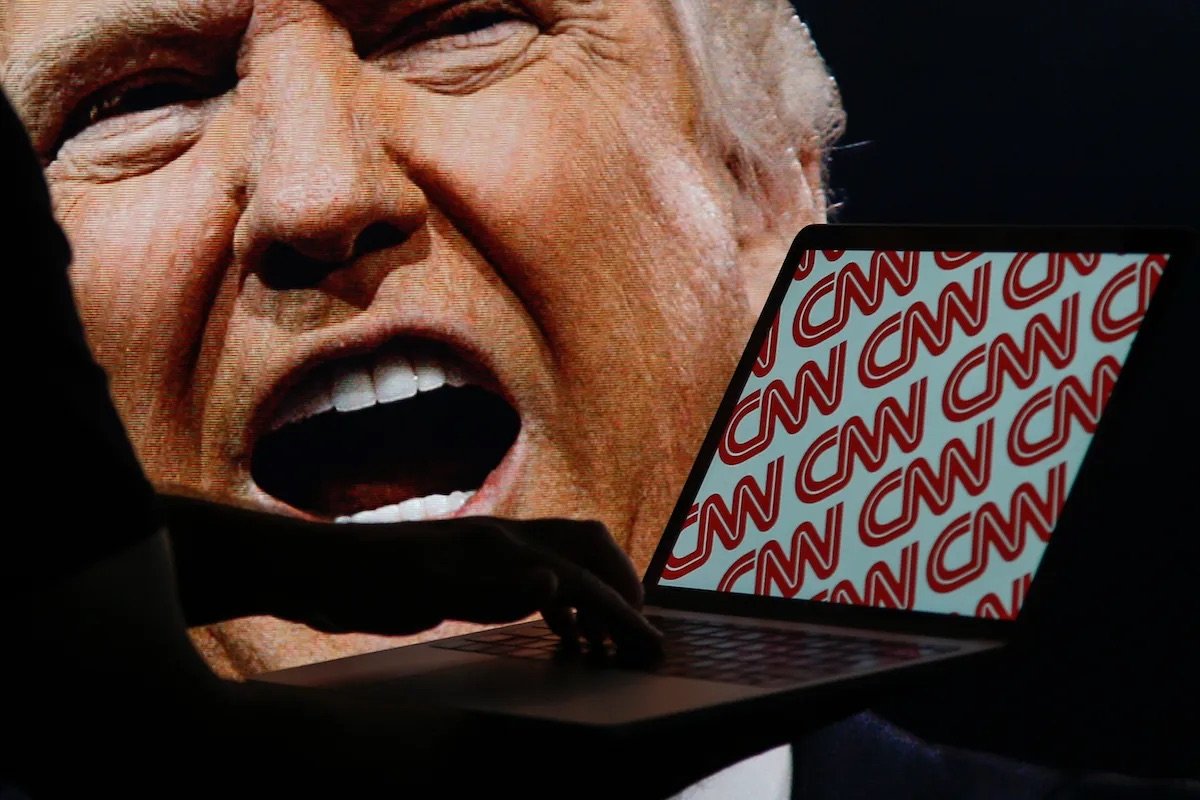Democrats PLEASE Try To Fix This Problem



(Photo by Jaap Arriens/NurPhoto via Getty Images)
If they ignore the media environment in their 2024 post-mortems, it will be the first major error of the second Trump era.
Several months ago, before Joe Biden dropped out of the race for president, I participated in a forum discussion about the brokenness of the U.S. political system, and one of my co-panelists, Seth Masket, volunteered a concession. By this point, inflation had normalized, wages were rising, the economy was growing, employment was full…but Biden was trailing in the polls, with seemingly no idea how to improve his own standing. Democrats had counted on fundamentals like growth and incumbency to save Biden, the way lift pulls an airplane into the sky, but it didn’t seem to be happening. If Biden loses under economic conditions like these, Masket said, “we [political scientists] will have a lot of explaining to do.”
I don’t dredge this up as any kind of gotcha. I mention it only in the hope that analytically inclined people—not just political scientists, but including them—will follow through in earnest, and search for an explanation. Less than three days after Donald Trump won the 2024 election outright, I see recriminations falling along the same lines they always do—Dems abandoned the working class vs. Dems didn’t abandon the working class, the working class was just mad about the bad economy—as though the whole theory of politics hadn’t just been dealt a severe blow. Instead of reasoning forward—why did Democrats lose despite the strong economy?—most liberal elites are arguing in reverse: Democrats lost, thus the economy must be bad.
And so this is my early effort to kick off that search. To try once more to get everyone who slips back into this interminable debate to rethink the premise.
Left-of-center politics is shaped heavily by the belief that class-based appeals to members of the working class are the key to building a sustainable coalition. Lose the trust of the working class, good luck to ya.
The latter piece is mostly just mathematics. The working class is huge. The supposition is that the way to align members of the working class into political coalition with one another is by making them “know” that one party is a much more reliable steward of their economic interests than the other. It’s not just for moral reasons that when Democrats gain power, they try to increase working-class wages, enhance working-class benefits, and make gestures of solidarity with the working class.
Because most Democrats and most liberals agree on the premise, internecine fighting reflects factional differences over how to attract the working class. With a specific agenda? Through craftier messaging? By delivering on campaign promises?
My hope is Tuesday’s catastrophe will create space for the smartest people working in broadly left politics to question the supposition.
Because one of two things must be true:
Democrats need a completely different approach to making members of the working class know in their guts that one party is a much more reliable steward of their economic interests than the other.
Their theory of working-class politics is wrong.
BRAND, DAMAGED
Now zoom deep into the realm of partisan elites.
Every honest person working in politics, including the remaining few honest Republicans, knows which party is mission-driven to help working-class people directly, and which party is not. Some of these Republicans might claim to believe that the GOP’s austere, plutocratic goals are in the long-run interest of the working class; that catering to the productive rich produces trickle down benefits for those who pick themselves up by the bootstraps, etc. But everyone at the professional level knows the score: When Democrats win power, they reach for levers that direct more economic and political support to they working class. They reach for the minimum wage (though have lacked the votes to overcome a filibuster), for food support, for improving health and child benefits, and so on. Republicans reach for tax cuts and deregulation.
Thus, it should not be controversial to stipulate here that if working-class people without firm partisan attachments studied and understood these two parties and their budgets, they’d view Democrats as the better steward of their interests every time. They’d never drift secularly toward the GOP.
But of course, that’s exactly what’s happened.
So what’s gone wrong then? As I see it, at least one of these things is true:
Working Americans either can’t perceive the differences between Democrats and Republicans because Democrats don’t deliver enough, or workers don’t think the Democratic agenda is sufficiently better than the GOP agenda to merit partisan loyalty. The Democratic agenda lacks zhuzh or oomph, or ideal indicators of class-based solidarity. Without radical change, workers will vote on other bases.
Too many working Americans don’t know elemental facts about the parties’ economic commitments. The problem is mostly about information. Perhaps a weakness in Democratic messaging or a triumph of obfuscatory right-wing propaganda or a combination of the two.
People’s perceptions of the economy don’t form solely on the basis of their material well-being—they can be made to feel insecure or aggrieved even when their standards of living are on the rise.
The theory is wrong—working class people do not dependably cast votes on a single-issue class basis. Improving their understanding of the differences between the parties through platform changes, policy reforms, and/or better messaging will not translate into a political re-realignment.
There may be some merit in all of these, but I believe this election strained the first explanation to its breaking point. And if the story is mostly a mix of 2, 3, and 4, the counsel is similar: flood the information zone, ideally with credible messengers. Either you need these voters to absorb the binary truth about partisans politics and the material state of the world, or you need them to like you on other bases, or both. And the only way to do that is to clean up misperceptions with constant reminders. That is, through media.

